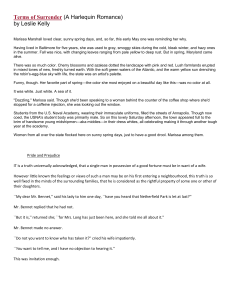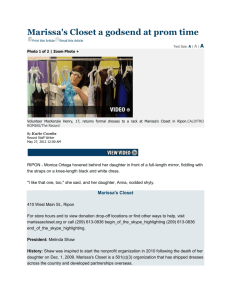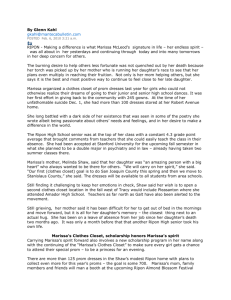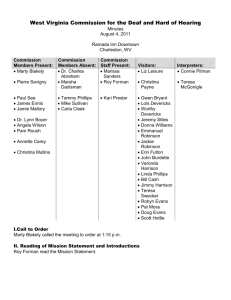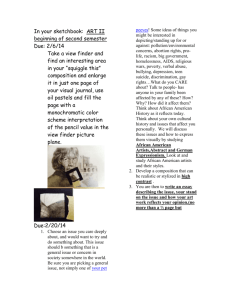Being Michael Bevons - Staunton City Schools
advertisement
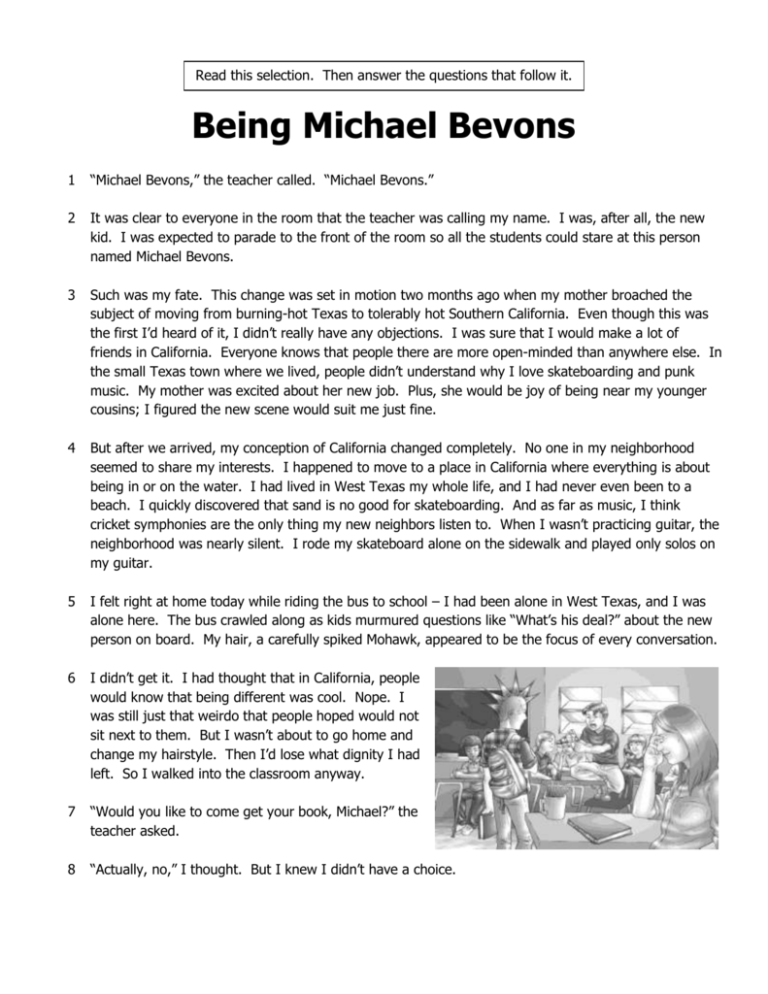
Read this selection. Then answer the questions that follow it. Being Michael Bevons 1 “Michael Bevons,” the teacher called. “Michael Bevons.” 2 It was clear to everyone in the room that the teacher was calling my name. I was, after all, the new kid. I was expected to parade to the front of the room so all the students could stare at this person named Michael Bevons. 3 Such was my fate. This change was set in motion two months ago when my mother broached the subject of moving from burning-hot Texas to tolerably hot Southern California. Even though this was the first I’d heard of it, I didn’t really have any objections. I was sure that I would make a lot of friends in California. Everyone knows that people there are more open-minded than anywhere else. In the small Texas town where we lived, people didn’t understand why I love skateboarding and punk music. My mother was excited about her new job. Plus, she would be joy of being near my younger cousins; I figured the new scene would suit me just fine. 4 But after we arrived, my conception of California changed completely. No one in my neighborhood seemed to share my interests. I happened to move to a place in California where everything is about being in or on the water. I had lived in West Texas my whole life, and I had never even been to a beach. I quickly discovered that sand is no good for skateboarding. And as far as music, I think cricket symphonies are the only thing my new neighbors listen to. When I wasn’t practicing guitar, the neighborhood was nearly silent. I rode my skateboard alone on the sidewalk and played only solos on my guitar. 5 I felt right at home today while riding the bus to school – I had been alone in West Texas, and I was alone here. The bus crawled along as kids murmured questions like “What’s his deal?” about the new person on board. My hair, a carefully spiked Mohawk, appeared to be the focus of every conversation. 6 I didn’t get it. I had thought that in California, people would know that being different was cool. Nope. I was still just that weirdo that people hoped would not sit next to them. But I wasn’t about to go home and change my hairstyle. Then I’d lose what dignity I had left. So I walked into the classroom anyway. 7 “Would you like to come get your book, Michael?” the teacher asked. 8 “Actually, no,” I thought. But I knew I didn’t have a choice. 9 In the few moments before I was to make my move, I had already calculated the number of steps it would take to reach her desk-- nine. I hoped to blaze the path with the quickness of a sprinter. As I took each step, I cringed, thinking at any point that the whispering would start again. 10 “We’re starting a new chapter today, so you came on a good day, Michael,” the teacher said cheerfully. She was holding out the book with both hands and smiled as I took it from her. 11 “One more thing,” she said. “Robert will show you around today.” 12 “All right,” I muttered before starting back to my seat. 13 “He’s the class clown,” the teacher said, “so don’t let him annoy you too much.” She seemed to be addressing Robert rather than me. 14 As I scanned the room, one student hopped on his chair and started acting like a monkey, miming the peeling of a banana and grunting. “He’s the class monkey today,” a student near him said. 15 Robert was the perfect shield. While he was distracting the other students, I quickly retreated to my desk. 16 The rest of the class time went by fairly quickly. Fortunately, everyone appeared engaged with the teacher’s lesson, so no one was looking my way. When the bell rang, I let most of the students exit before I did. Robert came to my side and asked what was next on my schedule. 17 “Science- Room 120 B,” I said. 18 “You’re going to love that,” Robert said. 19 “Really?” I asked. 20 “No, not at all. I was kidding,” he quickly replied, smiling. “I’m in there, too, and it’s a true test of my clowning skills to make that class interesting.” 21 So we walked together to Room 120B. Robert told me to take a desk near his. After science was math. I was on my own, since Robert went to band class then. 22 Robert peeked at my schedule before he left and saw that we both had lunch at the same time. He told me to wait for him outside my math class. I did. I waited and waited, but Robert didn’t show up. I told myself I should have known better and started toward the lunchroom alone. 23 Then I heard someone call, “Hey, Michael. Wait up.” Robert was lugging a tuba case. 24 That was when I began to think that this move might just work out okay. “Dude, you play the tuba? That could be so punk!” I said. “Let me tell you what I’ve got in mind.” Answer questions 1-12. 1. At first, why is Michael mostly pleased about moving to California? a. He knows he can skateboard there. b. He wants to meet others who share his interests. c. He thinks the weather will be more comfortable. d. He can play guitar there. 2. What message does the author convey throughout the selection? f. How you look is not as important as the way you think. g. Meeting people who are like you can happen at any time. h. If you move to a new place, be prepared to encounter strange people. j. 3. It is important to be yourself even though it may be difficult. Paragraphs 8 and 9 are mainly about Michael’s desire to – a. Get to know his teacher. b. Get his new book. c. Avoid attention. d. Count the number of steps he takes. 4. The author organizes this selection byf. Explaining why Michael wears a Mohawk. g. Comparing Michael’s reasons for wanting to move with his mother’s reasons h. Listing facts about Michael’s new neighborhood in order of importance j. Describing Michael’s awkward start to his first day and how things improve 5. Look at the diagram below. Which of the following would best belong under “Michael and Robert”? a. Enjoy being different b. Mock other students c. Follow popular trends d. Try to be funny 6. In paragraphs 1 and 2, the author creates a mood of – f. Confusion g. Uneasiness h. Sadness j. 7. Anger What is Michael’s main conflict in this selection? a. Wanting to be liked for himself b. Having to be around his cousins c. Finding a place to skateboard d. Avoiding talking to other kids 8. When Robert does not show up right away after math class, Michael starts walking toward the lunchroom becausef. He hopes to meet Robert there g. He is too hungry to wait h. He thinks he has been abandoned j. He wanted to get a good seat 9. The kids on the bus appear to view Michael’s hair as – a. Fashionable b. Boring c. Unusual d. Threatening 10. In paragraph 15, why does Michael say that Robert is “the perfect shield”? f. Michael needs help finding his way around the school g. Robert can protect Michael from unwanted attention. h. Michael believes that Robert is fun to be around. j. Robert has a talent for making people laugh 11. Michael first realizes California is not the way he thought it would be after hea. Sits in his first class b. Meets other students c. Takes his first ride on the school bus d. Examines his new neighborhood 12. The reader can conclude that when Michael sees Robert’s tuba case, hef. Thinks Robert will want to learn to play other instruments g. Thinks Robert will have to return to band practice h. Wants to help Robert carry the instrument j. Hopes to play music with Robert Read this selection. Then answer the questions that follow it. What’s the Weirdest Thing About Austin? Residents of Austin, Texas, are proud of their city’s uniqueness. For this reason the slogan “Keep Austin Weird” was created in 2000. An Austin middle school recently held an essay contest called “What’s the Weirdest Thing About Austin?” Here are three of the essays submitted by students. Time for a Pun-Off By Allison Peters 1 Do you love to play with words? Maybe you’d rather just sit back and listen to others do so. Every year in May, I watch my father participate in one of the wackiest events in Austin. He stands up in front of an audience and tells terrible jokes. Once year his jokes were so bad that he won a prize! 2 Just what is this crazy contest? It’s the O. Henry Pun-Off World Championships, of course! The contest is named for O. Henry, the famous American writer. Apart from his masterful storytelling, he is remembered for his talent for punning. A pun is a kind of joke that plays with words that sound similar but have different meanings. Here’s an example: “When a clock is hungry, it goes back four seconds.” The words seconds could refer to a unit of time or an extra portion of food. No, it’s not exactly funny, but a groan is as good as a gold medal for an accomplished punster. 3 The annual O. Henry Pun-Off World Championships are held at the O. Henry Museum, the writer’s former Austin home. The competition began in 1977 with two separate contests. The first is called the Punniest of Show. Each contestant performs a prepared routine for an audience. Four judges then decide the winner. The second part is the High-Lies and Low-Puns Contest, where 32 contestants split up into pairs. After receiving their topic, each pair must pun back and forth together as quickly as possible, trading jokes and puns in a mad game of verbal tennis. In the end the funniest and longestlasting punster wins. 4 It is amazing to hear these word masters come up with hilarious puns under pressure. If you love language and enjoy hearing people play with words, come to the O. Henry Pun-Off—it’s definitely weird! Racing Austin Style By Cameron Elizondo 5 The only thing better than taking part in the fifth largest race in the country is running it while wearing an outrageous costume. Since 1978, the Statesman Capital 10K has drawn about 15, 00 runners annually. It attracts attention for its size and for its wackiness. 6 Each year near the beginning of April, people gather together on a Sunday morning to run through the city. Serious runners usually compete in conventional running clothes- shorts and running shoes. But for many participants, having fun is more important than winning. These runners dress in the most creative costumes imaginable. Many are representative of the city. For example, in 2006 a runner came dressed as an Austin street sign. Another runner was dressed as the University of Texas tower, a well-known local landmark. Costumes in past years have included a chicken head and an armadillo. One group even ran as a giant centipede. You’d think it would be difficult to run 6.2 miles through downtown while wearing a costume, but hundreds of people do it every year! 7 The race, organized by the Austin American-Statesman newspaper, brings in money for various charity organizations, as much as 1.5 million since 1993. About 2,000 volunteers donate their time to make the race a success. Many Austin residents consider this event to be a race, a costume parade, and a block party, all in one. Come out to the next Statesman Capitol 10K! You’ll get fit, help raise money for a worthwhile charity, and have fun too! All You Needs Is SPAM By Paul Thuyen 8 How many main ingredients do you need to create a magnificent meal? The folks at SPAMARAMA would probably say, “Just one!” If you like to eat or prepare unusual foods, Austin is the perfect venue to satisfy your appetite. 9 SPAMARAMA is definitely the strangest even in Austin—and probably in all of Texas. It’s a festival that celebrates SPAM, a canned pork product. In 1976 David Arnsberger and Dick Terry started the tradition as a fun alternative to the ever-popular chili cook-off. About 10,000 people come each year to sample fabulous recipes created for the SPAM cooking contest. Some entries in this cook-off are familiar dishes like SPAM sandwiches and casseroles, while others, such as SPAM ice cream, Moo Goo Gai SPAM, and GuacaSPAMole, are true novelties. 10 The contest has two divisions: one for professional chefs and restaurant owners, and one for amateur cooks. In the amateur division, everyone is welcome to show their stuff. One contestant entered the contest with a dish that was a mixture of cheddar cheese, mayonnaise, SPAM, and raisins. The dish’s poor rating at the contest did not deter this stubborn individual. Hoping to find a more accepting panel of judges, he froze his entry and brought it back the following year. In keeping with the spirit of the event, the judges decided to create a “last-place-even-if-there-were-a-hundred-entries” award just for him. 11 But the cook-off isn’t the only even that pulls in audiences at SPAMARAMA. Those who don’t want to actually eat SPAM can play with it instead. The SPAM toss (similar to an egg toss) is entertaining to watch, and so is the Tug-of-War that takes place across a huge vat of SPAM jelly. Artistic types can enjoy the SPAM-carving display, which features “SPAM sculptures” of animals, people, and much more. 12 SPAMARAMA takes place annually on the first weekend of April. Not surprisingly, the event often falls on – or close to- April Fool’s Day, but it’s 100% real! And there’s still time for you to create next year’s award-winning recipe. Answer questions 13-23 13. In paragraph 2, the words “a groan is as good as a gold medal” suggests that— a. Receiving a groan in response to a pun is a mark of success b. People cast their votes for a contestant by groaning c. Competitors often make strange noises for effect d. Actual prizes are never awarded at pun-offs 14. Which of these sentences from “Racing Austin Style” is an opinion? f. Costumes in past years have included a chicken head and an armadillo. g. Another runner was dressed as the University of Texas tower, a well-known local landmark. h. The only thing better than taking part in the fifth-largest race in the country is running it while wearing an outrageous costume. j. Each year near the beginning of April, people gather together on a Sunday morning to run through the city. 15. In paragraph 3, the phrase “trading jokes and puns in a mad game of verbal tennis” helps the reader understanda. The pace and competitiveness of the event b. How difficult it is to watch a pun-off c. The amount of time required to compete in the pun-off d. Why contestants are divided into pairs 16. What does the word venue mean in paragraph 8? f. People g. Location h. Challenge j. Restaurant 17. One contestant in the SPAMARAMA froze his food entry because he— a. Planned to carve it b. Missed the entry deadline c. Wanted it to be eaten cold d. Thought he deserved to win 18. Which of the following is the best summary of the selection? f. Every year local residents and visitors alike help demonstrate the spirit behind the slogan “Keep Austin Weird” by taking part in some unusual events. These event include a Pun-Off World Championship, the Statesman Capitol 10K costume race, and a SPAMARAMA spam cookoff contest. g. People in Austin, Texas, take great pride in being different from other Texans. This pride has inspired Austin residents to create unusual events such as a 10K race in which people wear creative costumes. The city even has a slogan, “Keep Austin Weird,” which captures the city’s spirit. h. One of the ways that residents in Austin, Texas, are trying to live up to the slogan “Keep Austin Weird,” which was adopted in 2000, is by hosting events unlike any that are held elsewhere in the state. One of the most unusual of these events is SPAMARAMA. Each year many people come out to compete in cooking and carving this meat product. j. Austin, Texas, hosts three unusual events every year. One of these events is a race in which runners wear unusual costumes as they run through the streets of the city. Another of these events is a punning contest. This contest is held in honor of one of Austin’s most famous former residents, the author O. Henry. 19. A walking street sign might be found at— a. The Austin American Statesman b. The Statesman Capitol 10K c. The O. Henry Pun-Off d. SPAMARAMA 20. How is “All You Need is SPAM” organized? f. Chronological, Sequence g. Problem/ Solution h. Concept/ Definition j. Process 21. The most likely purpose of the selection is toa. Persuade b. Entertain c. Inform d. Express 22. Which sentence from “Time for a Pun-Off” best shows that the author is impressed by the skill of the participants? f. If you love language and enjoy hearing people play with words, come to the O. Henry Pun-Offit’s definitely weird! g. It’s amazing to hear these word masters come up with hilarious puns under pressure. h. A pun is a kind of joke that plays with words that sound similar but have different meanings. j. One year his jokes were so bad that he won a prize! 23. Read this dictionary entry for the word pull. Pull /’pul/ v 1. To attract 2. To exert force upon 3. To perform or carry out 4. To express sympathy for What is the definition of pulls as it is used in paragraph 11? a. Definition 1 b. Definition 2 c. Definition 3 d. Definition 4 Read this selection. Then answer the questions that follow it. 1 What do former president Bill Clinton and rock musician Pete Townshend have in common? Both men have hearing damage from exposure to loud music, and both now wear hearing aids as a consequence. As a teenager, Clinton played saxophone in a band. Townshend, who has the more severe hearing loss, was a guitarist for a band called the Who. He is one of the first rock musicians to call the public’s attention to the problem of hearing loss from exposure to loud music. 2 Temporary hearing loss can happen after only 15 minutes of listening to loud music. One early warning sign is when your ears begin to feel warm while you listen to music at a rock concert or through headphones. 3 “What happens is the hair cells [in the inner ear] are damaged, but they’re not dead,” says physician and ear specialist Dr. Sam Levine. According to Dr. Levine, if you avoid further exposure to loud noise, it’s possible to recondition the cells somewhat. However, he adds, “Eventually, over a long period of time, hair cells are permanently damaged.” And this is no small problem. When tiny hair cells in the cochlea (CO-klee-uh), a coiled tube in the inner ear, are damaged or destroyed, an abnormal sound is sometimes produced in a person’s head. This sensation of a ringing in the ears is called tinnitus (tinIH-tuss). Tinnitus can also consist of hissing, clicking, or buzzing sounds that can be heard only by the person affected with the condition. 4 What sound level is dangerous? According to Dr. Levine, regular exposure to noise in excess of 85 decibels is considered dangerous. A decibel is the unit of measurement for sound. Most people don’t carry around the scientific equipment that measures decibels, though. The chart on this page offers a comparison of decibel levels to certain sounds. Here’s another gauge you can use. If you’re at a rock concert and the music is so loud that you have to shout to make yourself heard, you’re at risk for hearing loss. That’s when wearing protective devices such as earplugs becomes critical. 5 The facts are pretty frightening. But are rock bands turning down the volume? Most aren’t. “Rock music is supposed to be loud,” says drummer Andrew Sather. “I wouldn’t have it any other way. And neither would the real fans of rock.” 6 Continued exposure to loud music and the failure to wear earplugs can lead to deafness, according to Dr. Levine. He states, “There’s no cure for tinnitus or hearing loss. Your ears are trying to tell you something. That ringing is the scream of your hair cells dying. Each time that happens, more and more damage is done.” Answer questions 24- 29 24. In paragraph 3, the word recondition means to— f. Not be seen g. Fill with sound h. Become larger in size j. Make good again 25. What is the purpose of the chart included towards the end of the article? a. To show readers that the only sounds that are dangerous come from music at rock concerts b. To warn readers against exposing themselves to the sounds on the list c. To give readers examples of the noise levels of some familiar sounds d. To inform readers that normal daily activities will cause hearing loss 26. The reader can tell that drummer Andrew Sather believes wearing earplugs for the “real fans of rock” isf. Unnecessary g. Unsafe h. Harmless j. Impolite 27. Which of these sentences is a warning from the author to the reader? a. Most people don’t carry around the scientific equipment that measures decibels, though. b. When tiny hair cells in the cochlea (CO-klee-uh), a coiled tube in the inner ear, are damaged or destroyed, an abnormal sound is sometimes produced in a person’s head. c. If you’re at a rock concert and the music is so loud that you have to shout to make yourself heard, you’re at risk for hearing loss. d. As a teenager, Clinton played saxophone in a band. 28. The tone at the beginning of the article isf. Factual g. Humorous h. Urgent j. Hostile 29. Look at this diagram of information from the article. Which of these belongs in the empty box? a. Must shout to have a conversation b. Permanent hearing loss c. Wear earplugs to rock concerts d. Hearing is checked by a specialist Read this selection. Then answer the questions that follow it. I Learned the Hard Rock Way Giving speeches at schools was something musician David Todman never pictured himself doing. He thought his life would always be devoted to music. But hearing loss changed all that. The following is his story in his own words. 1 I always thought that hearing loss was something that affects other people—and not only other people, but much older other people. 2 I was a guitarist in a rock band for nearly nine years, and before I attended every rock concert that came to town. If someone had suggested that I wear earplugs while playing or listening to music, I would have laughed. What was the point of listening to music if you couldn’t enjoy it at full volume? 3 When I first began playing in a band, I noticed that my ears would ring after a concert and in normal conversations people’s voices would sound muffled. But my hearing would return to normal in a day or two, so I didn’t think there was any problem. I now know that people can lose their hearing gradually. My doctor explained that repeated exposure, week after week, causes permanent damage. I didn’t realize that I had a problem until it was too late. 4 High-pitched sounds were the first ones I had trouble hearing. Different words- for example, hill, fill, and sill- sounded the same to me. 5 Sometimes my ears produce a low, dull sound, something between the hum of an organ and the purr of a car motor. At other times the sound is like the whooshing inside a seashell. The sounds can get so bad something that I can’t function. I become completely immobilized, often for hours at a time. 6 I’m now so aware of the dangers of listening to loud music that I speak about the subject to students in middle schools and high schools. I tell students about a study in which researchers found that about 17 percent of middle school and high school students have some degree of hearing damage or loss and that the most significant hearing loss was detected in student who attend rock concerts frequently. 7 It wasn’t until my hearing loss was diagnosed by my doctor that I learned how delicate people’s ears are. So please take my advice: protect your ears. Don’t go to loud rock concerts, or if you do go, use earplugs. It might not seem cool to wear earplugs, but let me tell you, hearing loss is definitely not cool. And, by the way, stuffing cotton in your ears won’t do much good. That will reduce sound by only seven decibels. 8 Earplugs are not for wimps. Three of the four members of the band Metallica wear earplugs. If you play in a band, you’ll still be able to hear yourself and the other instruments when you wear hearing-protection devices. Actually, you may hear more clearly once distracting noise is curtailed or even completely blocked out. Musicians’ earplugs are comfortable and easy to insert, and they filter sound better than disposable plugs. 9 Music once meant everything to me. It was the center of my life and is still important. But preserving my hearing means more. After all, what good is great music if you can’t hear it? Answer questions 30 – 34 30. Which of these best describes how Todman feels about his youthful experiences as a musician? f. He believes that playing in a rock band helped him become a better public speaker. g. He regrets having spent so many years playing in a rock band instead of developing other skills. h. He wishes that he had known the long-term effects of listening to and playing loud rock music. j. He is disappointed that he became involved in playing rock music rather than some other type of music. 31. What was one indication that Todman might have a problem with his hearing? a. Certain words began to sound alike to him b. He began wearing earplugs, which blocked out some sounds. c. Music at full volume became unbearable to listen to d. He was able to hear only sounds that were at a high pitch 32. Paragraph 5 is mainly aboutf. The sounds that are the most annoying for someone who has hearing loss g. The effect of hearing so many different sounds at high decibel levels h. The fact that a person with hearing loss can hear high and low sounds j. The kind of sounds that someone with hearing damage can experience 33. When Todman speaks to students, he wants them toa. Understand their risks of developing hearing loss b. Be involved in playing in rock bands c. Know that he still hopes to perform with a rock band one day d. Believe that wearing earplugs is the only option they have to prevent hearing loss 34. Which word best describes Todman? f. Humorous g. Formal h. Concerned j. Patient Read this selection. Then answer the questions that follow it. The Hard Truth 1 The track was almost deserted. Only Marissa and one other kid were still practicing. Marissa studied the high-jump bar and reminded herself about the techniques she had been practicing for weeks. She shook her hands, trying to loosen up. Then she ran the short distance, planted her foot in front of the bar, and jumped. But instead of flying gracefully over the bar, she knocked it down, and both Marissa and the bar landed on the mat with a thump. She lay there for a moment, thinking about the mess she had gotten herself into. 2 Marissa’s mother had been a track star in school. They school trophy case was full of trophies and medals with her mother’s name on them. A few weeks ago Marissa had had the idea to sign up for track. She thought it would make her mother happy. But now she realized that no matter how hard she worked, she would never be a track star like her mother. 3 As Marissa got up from the mat, she noticed a spider web between one of the vertical poles and the ground. It glistened in the sunlight. A spider was weaving a litter pattern. It wasn’t trying to be something else, like a butterfly or a grasshopper, Marissa though. It was content to be exactly what it was and to do what it was good at- spinning webs. It even worked out in the open so everyone could see it. The spider did what came naturally to it. 4 What came naturally to Marissa was art. She could paint, draw, or sketch all day long and never get tired or bored. But Marissa didn’t want to hurt her mother, who had taken pictures of Marissa in her track uniform and sent them to all the relatives. Her mother had even written a caption underneath that read “Second-Generation Track Star.” But the first track meet was coming up in a few weeks, and Marissa knew her mother would be completely mortified when she saw how terribly Marissa would perform. She had to find a way out of this mess without embarrassing her mother. 5 Later that night at the dinner table, Marissa pushed her peas around until they formed a circle on her plate. Her mother was washing dishes at the sink and noticed what Marissa had done. “You’ve got track on the brain. You’re even turning dinner into your new favorite thing! What does Coach Evans think about your jumps?” her mother asked. 6 Marissa shrugged and smiled halfheartedly. Who was she kidding? Why had she thought that just because her mother had been good at the high jump, she would be, too? 7 It was the perfect time to tell her mother how she felt about track, but… “He says to keep working hard” was all Marissa could manage before she headed upstairs to do homework 8 In her bedroom Marissa stared out the window. Then she turned to the stack of homework in front in her. There was so much. Before she had signed up for track, she would come home from school, do her homework, have dinner with the family, and then have time for her art. Now she got home late, ate dinner alone, and started her homework. There was no time for anything else. 9 Halfway through her homework, Marissa fell asleep. When she woke up from a troubled dream, the clock read 1:00 A.M. Marissa panicked. There was still so much homework to do, but she really needed her rest for track practice in the morning. Marissa had always been a good student, but now track was threatening her grades. 10 Then a dark thought crossed Marissa’s mind like a cloud covering the moon. If she failed some of her classes, she would be off the track team. That was one way to solve her problem. 11 The next day at school, Marissa was missing two assignments. During math, she couldn’t follow the lesson because she hadn’t done her homework. She failed the quiz and earned a surprised scowl from her teacher. 12 After a week of deliberately ignoring her homework, Marissa had a stomach full of knots. Letters had been mailed out to parents listing grades, and Marissa knew her letter would show that her grades had dropped drastically. She trudged home, knowing her ugly plan of neglect had worked. 13 Just as Marissa had suspected, her mother was waiting on the front porch, with the letter in her hand. She held it up to Marissa. “What’s happening to your grades?” she asked, thrusting the letter toward her daughter. “And more importantly, what’s happening to you?” 14 At that moment Marissa knew what she had to do. On the verge of tears, she admitted her secret. “I only joined the track team to make you proud of me. I hated it, but I didn’t want to disappoint you. I thought if I was failing in my classes, Coach would kick me off the team. What a mess I’ve made of everything.” 15 Marissa watched her mother’s face turn from anger to concern. “Marissa, I was always proud of you. You are a wonderful artist, a good student, and a great daughter. You didn’t need to do the high jump to make me happy.” Her mother paused and then looked at Marissa seriously before she continued. “The next time you have a problem, you need to let me know. We can talk about this later. But for now you have a lot of hard work in front of you because you made a bad choice.” 16 Marissa knew it would not be easy to repair the damage she had done, but she felt the knots untying in her stomach. She thought again about the little spider and how it was so focused on spinning its web. She realized that she had lost sight of her purpose and tangled up her web. Now she had to go back and rebuild that web. Answer questions 35-45 35. In paragraph 6, the author uses the word halfheartedly to show that Marissa smiles with-a. Complete boredom b. Tremendous patience c. Much eagerness d. Little enthusiasm 36. The reader can conclude that Marissa’s motherf. Believes that Marissa is not trying hard enough g. Wants Marissa to pursue her own interests h. Suspects that Marissa does not like her schoolwork j. Puts pressure on Marissa to be a successful athlete 37. Paragraph 8 is mostly abouta. What time Marissa gets home from school b. How Marissa’s life has recently changed c. Whom Marissa eats dinner with d. How much homework Marissa has to do 38. Which of the following is the best summary of the selection? f. Marissa joins the track team although she would really prefer to focus on art. Her mother believes Marissa enjoys track and jokes about it with her. Because track practice takes a lot of time, Marissa’s grades fall. Finally Marissa admits that she dislikes track. g. Marissa’s mother was very good at track when she attended school. Marissa sees trophies and medals that her mother won in the trophy case at school. Marissa wants to be as good at track as her mother so she trains hard. Marissa discovers that she is not good at track. h. Marissa signs up for track to please her mother, a former track star. Marissa is better at art than track but fears disappointing her mother. So she stops doing her homework, hoping that she will be taken off the team. After her grades worsen, Marissa confesses to her mother and realizes what she needs to do. j. Marissa joins the track team, and her grades begin to fall. The school sends a letter home, and Marissa discuses her grades with her mother. Marissa’s mother tells Marissa to come talk to her the next time she has a problem. Marissa’s mother tells Marissa that she is a wonderful artist and a good student. 39. Why does Marissa eat dinner alone each night? a. She stays after to get help on her assignments. b. She has more homework now than she did before. c. She has changed her usual routine. d. She is being punished for her poor grades 40. Which sentence from the selection best shows that Marissa feels she must succeed at track? f. Her mother had even written a caption underneath that read “Second-Generation Track Star.” g. But now she realized that no matter how hard she worked, she would never be a track star like her mother. h. “He says to keep working hard” was all Marissa could manage before she headed upstairs to do homework. j. Marissa watched her mother’s face turn from anger to concern. 41. Seeing what happens from Marissa’s viewpoint helps the reader understand the— a. Motives of other characters b. Events that will occur later in the story c. Main character’s inner thoughts d. Multiple problems in the story 42. Why is paragraph 13 important to the story? f. Marissa’s mother discovers that Marissa has a problem g. The setting is described h. Marissa’s mother is described as a strong character j. The flashback ends. 43. Which words from paragraph 12 does the author use to create a mood of despair? a. Mailed out to parents b. Ugly pain of neglect c. Letter would show d. Listing grades 44. What is Marissa’s main problem in the story? f. She cannot find her true talent. g. Her mother pushes her to join the track team. h. She joins the track team, but she would rather do something else. j. Her grades are important, but she needs more time on the track. 45. Read this sentence from paragraph 10 of the selection. Then a dark thought crossed Marissa’s mind like a cloud covering the moon. The author uses this simile to showa. Why Marissa has fallen asleep b. Marissa’s feelings about her mother c. How the evening sky looks to Marissa d. The beginning of Marissa’s plan
